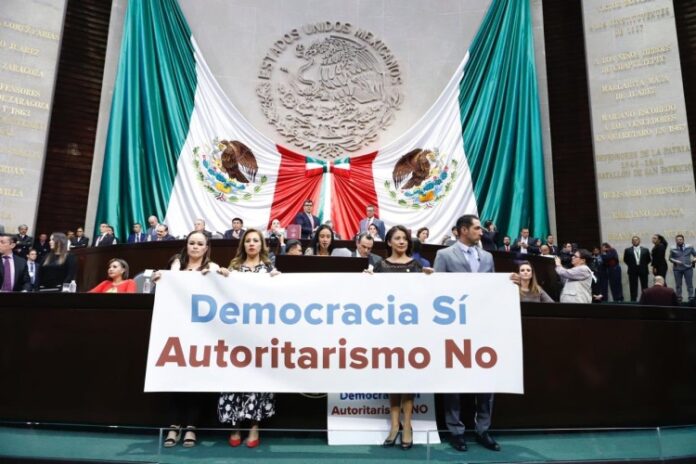Mexico is divided into thirds when it comes to support for democracy: 35% prefer it over any other form of government, 33% think that an authoritarian government may be preferable to a democratic one, and 28% are indifferent to it.
Worse still, support for democracy in the country has been decreasing from 2020 to date, since three years ago 43% supported democracy.
In addition, while the regional average of support for democracy as a form of government is 48%, in Mexico it stands at 35%, and it is here where support for authoritarianism grew the most: 11 percentage points from 2020 to 2023.
For this reason, the Latinobarómetro 2023 study places Mexico as one of “the countries with weak or receding democracies”, and abounds:
“Mexico suffers a loss of support for democracy between 2020 and 2023, from 43% to 35% (eight percentage points), at the same time as an increase in indifference to the type of regime of two percentage points, reaching 28%. Democracy has deteriorated a lot since 2020 in Mexico, according to the negative evolution of these indicators. There is also fertile ground here for authoritarianism and populism”.
Latinobarómetro is a study that has been carried out since 1995, and is financed by international organizations such as the Spanish Agency for International Development Cooperation (AECID), the Institute for the Integration of Latin America and the Caribbean (INTAL) and the Inter-American Development Bank (IDB).
Mexico is also among the countries where indifference towards democracy grew
In his most recent study, he warns about the democratic recession in Latin America, where several countries are in a critical state and others no longer have democracy, such as Venezuela and Nicaragua. In the latter, in fact, it was impossible to carry out the study due to the lack of guarantees for the pollsters.
When wondering what causes this democratic recession, the study warns: “personalism, the weakness of political parties that give people in positions of responsibility even more power, is one of the most perverse elements that is undermining democracy. Corruption twists the power of the vote by intervening in electoral campaigns with huge sums of money and causes unfair competition. The corruption of power at the presidential level is a brutal way of undermining the foundations of democracy, because it brings people to the presidency who would not have made it without those illicit funds.”
Mexico reduced its support for democracy by 11%, according to the study.
At the regional level, support for democracy has decreased in nine countries: the Dominican Republic, Chile, Bolivia, Uruguay, Paraguay, Guatemala, Mexico, Costa Rica and Venezuela.
In the case of Mexico, the increase from 26 to 28% of those who think that “a democratic regime is the same as a non-democratic one” is surprising, and the increase, from 22 to 33%, of those who say that “in some circumstances an authoritarian government may be preferable to a non-democratic one”.
Mexico, among the countries with the least support for democracy
The study abounds: “Mexico must be carefully observed at a time when its president, Andrés Manuel López Obrador, is trying to modify the laws that govern elections to improve the options of his party. It is a clearly authoritarian action that could count on the support of this third of the population”.
Democracy according to sex, age, education and social class
The Latinobarómetro shows that women (45%) support democracy less than men (51%) and are more indifferent to the type of regime (29% women versus 26% men). At the regional level, there are no differences by sex in terms of authoritarianism.
By age, while among the youngest (16-25 years) only 43% support democracy, among the oldest (61 and over) it is 55%. The older, the more support for democracy.
And in the attitude towards authoritarianism, the relationship is inverse: there is more support for authoritarianism from the younger the person (20% among those aged 16-25 and 13% among those aged 61 and over).
Regarding the educational level, it is observed that the higher the education, the more support for democracy: 40% among those interviewed with basic education and 60% among those with a university education.
And in terms of social classification, the study warns that the higher the social class, the less support there is for democracy. In the upper class, 37% support democracy, while in the lower class it is 44%.
Source: Animal Politico






